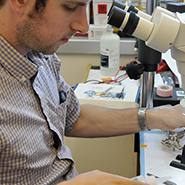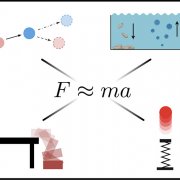Babies have certain expectations about the physical world - how things should move, fall, contain, splash, break and bump. Some of these expectations are in line with adult reasoning, but some are quite different, and change over the first few months of life (Baillargeon 2008). This project aims to formally describe the early-present physical knowledge in infants, and how it changes over time. We focus on the concepts of force and mass, and how they form an elementery Newtonian calculus that might serve as the basis of physical reasoning. The project uses a combination of formal tools and empirical studies with infants. The formal tools include different physics-engines, of the sort used for games and simulations. The empirical studies include looking-time studies with infants, shown different physical scenes featuring novel force dynamics.
Development of Intelligence
 Understanding the development of intelligence in a human infant is a key project of CBMM. This project engages the fundamental tradeoff between nature and nurture, or priors and data, and ultimately the origin of priors—how constraints are selected by evolution, encoded in genes, and instantiated in genetically wired brain circuits.
Understanding the development of intelligence in a human infant is a key project of CBMM. This project engages the fundamental tradeoff between nature and nurture, or priors and data, and ultimately the origin of priors—how constraints are selected by evolution, encoded in genes, and instantiated in genetically wired brain circuits.
This project also represents a novel developmental approach to building human-like artificial intelligence systems and comprehensive computational models of human cognitive architecture. Instead of branching out from a single area of adult human intelligence, we start with an integrated cognitive model of multiple core capacities in the young child’s mind, along with a set of developmental or learning mechanisms for scaling up to an adult model.

